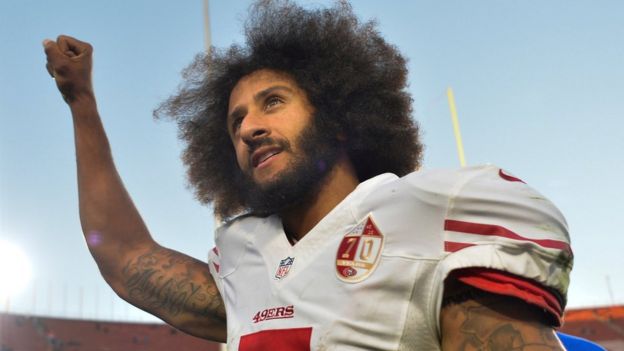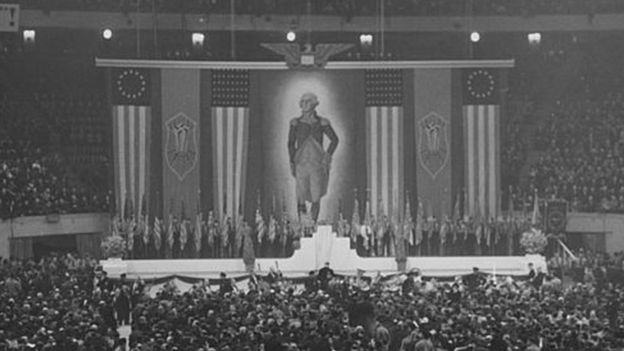
Arizona has pulled a $1m grant to help Nike build a new factory in a dispute over the firm's withdrawal of a trainer allegedly featuring racist symbolism.
The state's governor had condemned Nike's decision, which was prompted by complaints about its use of an old US flag embraced by white nationalists.
Nike-sponsored sportsman Colin Kaepernick had criticised the trainers, now selling on websites for $1,500.
But governor Doug Ducey said Nike had bowed to political correctness.
The special edition Air Max 1 Quick Strike Fourth of July trainer features the Betsy Ross flag.
With a circle of 13 stars representing the first US colonies, the flag was created during the American Revolution. Although opinion is divided over its origins, the flag was later adopted for use by the American Nazi party.
Nike said it withdrew the trainers "based on concerns that it could unintentionally offend and detract from the nation's patriotic holiday".
On Tuesday the trainers were selling for well over $1,500 on StockX, the online marketplace for trainers.

Colin Kaepernick was a quarterback for the San Francisco 49ers for six years
Earlier, Mr Kaepernick, a former NFL star, reportedly told Nike that he found the flag offensive because of its connection to the era of slavery. Other critics also raised concerns with Nike.
Last year, he became the face of Nike's advertisement marking the 30th anniversary of the company's "Just Do It" slogan.
The former American football quarterback had previously sparked a furore by kneeling during the national anthem before games to protest against police violence against African-Americans.
But the decision sparked fury.

The Betsy Ross flag was used by the American Nazi Party as a symbol
Doug Ducey, the Republican governor of Arizona, said in a series of tweets: "Words cannot express my disappointment at this terrible decision. I am embarrassed for Nike.
"Instead of celebrating American history the week of our nation's independence, Nike has apparently decided that Betsy Ross is unworthy, and has bowed to the current onslaught of political correctness and historical revisionism," he said.
Later, the governor's office confirmed that the $1m from the Arizona Commerce Authority' Competes Fund had been withdrawn. The fund is designed to attract, expand or retain businesses to the state. The factory was expected to generate about 500 jobs.
Nike said in a statement it remained committed to making "a significant investment in an additional manufacturing centre which will create 500 new jobs". It did not mention the Arizona plant by name.
Georgia Lord, the mayor of the city of Goodyear in Arizona where Nike is building the new factory, said the city "had found itself in the middle of a difficult situation".
She said the Goodyear City Council had recently "unanimously approved a job creation agreement with Nike".
"This deal is expected to bring more than 500 jobs and a significant investment to the city. We will honor the commitment we made in our agreement," she added.
Texas Senator Ted Cruz also dismissed Nike's move as unpatriotic, writing on Twitter that the shoe giant "only wants to sell sneakers to people who hate the American flag". Other Twitter users called for a boycott of Nike products over the move.
However, Nike also received widespread support, with Twitter users pointing out that the flag had been used by white nationalists.
Matt Powell, senior industry adviser at the research and consultancy group NPD, said said Nike would probably find support among its core consumers.
"I think it's important to understand who Nike's core demographic is here. They're really focused on teens and looking at the commentary on Twitter and so forth, I don't see a lot of teens coming out with a negative attitude here," he said.
Mr Kaepernick has not played in the National Football League (NFL) since the 2016 season, and sued the organisation, arguing team owners deliberately froze him out because of his activism, later settling with the NFL.
Betsy Ross was credited with sewing the first "Stars and Stripes" flag in 1776, although this version of events has been rejected by modern US scholars.
Nike is not the only company to recently face a backlash over products labelled racially insensitive. In December, Prada pulled products accused of depicting blackface.
And on Monday, reality TV star and businesswoman Kim Kardashian said she would rename her Kimono line after people in Japan said her use of the term was disrespectful.